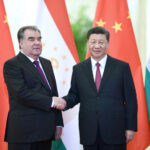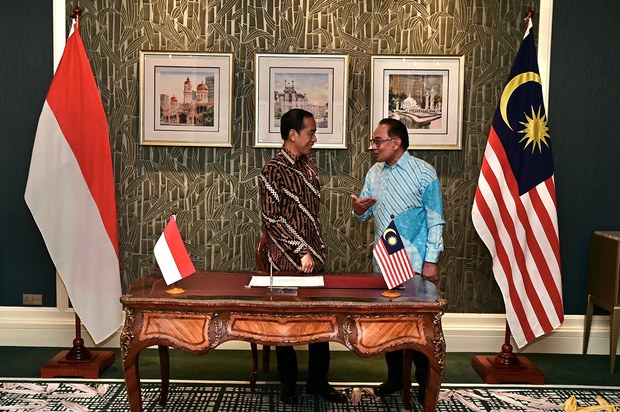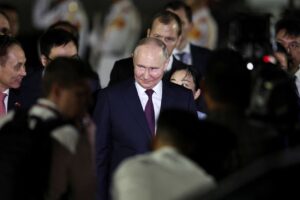Malaysian Prime Minister Anwar Ibrahim and Indonesian President Joko Widodo meet at Seri Perdana in Putrajaya, Malaysia, June 8, 2023
Malaysia and Indonesia have yet to reach full agreement on several maritime border disputes, including in the Sulawesi Sea, despite signing a number of treaties last week, Prime Minister Anwar Ibrahim said Tuesday, adding that such delicate matters need further discussion.
The two countries have been locked in an 18-year dispute primarily revolving around overlapping territorial claims in the Sulawesi Sea and the waters off the coast of Borneo island, which is divided between the two nations and Brunei.
During Indonesian President Joko Widodo’s visit to Malaysia last week, a joint statement between the two Southeast Asian nations announced the signing of six agreements, including two treaties on the delimitation of each nations’ territory in the Malacca Strait and Sulawesi Sea.
Though the treaties were heralded as a breakthrough after 18 years of negotiations, parts of the longstanding maritime dispute have not yet been resolved, Anwar said during question time in Malaysia’s Parliament on Tuesday.
“It should be noted that there are areas still under negotiation, including Sebatik Island and South Sulawesi, [which are] not included in this treaty because we will need to call a representative from Sabah [state] to discuss the matter. Hence, they have not been finalized due to a small outstanding issue,” he said.
Anwar said he had made it clear to Widodo – who is popularly known as Jokowi – that Malaysia stood firm on its territorial claims.
“President Jokowi, according to his experts, claims it belongs to Indonesia; so we have postponed and will continue discussions,” he said.
He also said the agreements did not include borders along Tanjung Pelepas Port in the southern state of Johor, a ship-to-ship transfer area.
The maritime disputes are significant for both nations due to their economic implications, including rights to fishing, oil and gas exploration, as well as maritime security.
Anwar was responding to a question in Parliament from opposition lawmaker Takiyuddin Hassan, who asked if Malaysia’s sovereignty had been compromised by signing the treaties.
The prime minister denied the government had defied expert opinion on the treaties. He said it had sought advice from various agencies including the foreign ministry, the maritime department, the National Security Council, the Department of Survey and Mapping, and the attorney-general.
“The question of sovereignty cannot be compromised,” he said, adding he also did not want to jeopardize bilateral relations.
“I will continue to consider Indonesia as a friendly nation … But we will not sacrifice even an inch of Malaysian territory.”

In a joint statement last week, Widodo said he welcomed the “settlement negotiation of territorial sea borders in [the] Sulawesi Sea and the southern part of the Malacca Strait after 18 years of the negotiation.”
However, analysts said the agreements were based on non-disputed areas and some of the most sensitive overlapping claims were left out.
“In this case, the differences still remain on disputed territories and both countries have maintained their rights and claims on the specific parts of the areas, including in the Port of Tanjung Pelepas,” said Collins Chong Yew Keat, a foreign affairs observer at the University of Malaya.
“These will be carried on in the rounds of discussions and talks, but the positive momentum of the agreement on the non-disputed areas will be a … better foundation in the talks.”
The Prime Minister’s Office and Malaysia’s foreign affairs ministry did not immediately reply to a request for more details on the treaties.
Teuku Faizasyah, a spokesman for the Indonesian Ministry of Foreign Affairs, said that the agreements signed last week were for the maritime boundaries in the southern part of the Malacca Strait and in the Sulawesi Sea.
“After this, the two countries still have to negotiate the boundaries of the exclusive economic zone and the continental shelf,” he said, adding maritime boundaries take a “long time to solve.”
The most sensitive areas of discussion were around where oil conglomerates from both countries have vested interests, such as exploration and the establishment of rigs, said Azmi Hassan, a geopolitical expert at the Nusantara Academy for Strategic Research.
Malaysia needed to sign a comprehensive treaty with Indonesia, said Mohd Hazmi Mohd Rusli, a research associate at the Asian Institute of International Affairs and Diplomacy at University Utara Malaysia.
“What Anwar is doing is a good sign,” he told BenarNews. “We need a treaty with a proper maritime delimitation line…like the one we had with Singapore in 1995.”
Anwar and Widodo said last week that continued maritime boundary negotiations would start soon on all remaining and unresolved issues.
Source: Benar News















